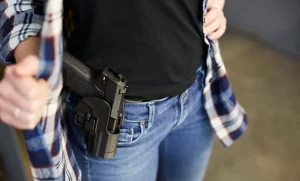
Conceal Carry
JACKSONVILLE, Fla. – Big changes with Florida’s gun laws are coming July 1 when a new law will allow eligible people to carry guns without a concealed weapons permit.
Until now, gun owners would apply for a license, take a class and get a background check to be able to carry a concealed firearm in the state.
But on July 1, Floridians who are eligible to own a gun will be allowed to carry a concealed weapon without needing a license.
The change is part of a larger bill (HB 543) championed by Florida Gov. Ron DeSantis and the Republican-controlled state Legislature.
But if you look at the language of the law, it’s complicated. So News4JAX took your questions to a police supervisor at the Jacksonville Sheriff’s Office.
“They no longer have to apply for that,” JSO Chief of Patrol Jaime Eason said. “However, they still have to follow the requirements if you work to get that concealed weapons license.”
Eason said the agency has been preparing for the change in law for quite some time, educating officers who will now educate the public.
READ: Everytown for Gun Safety’s response to Florida’s new gun law
Eason said despite some people’s concerns of Florida became the “Wild West,” he’s not worried about more people solving their problems with guns because of the change in the law.
“People that were not law-abiding citizens never got a concealed weapons license to begin with,” Eason said. “So they already had a gun. That hasn’t changed, but law-abiding citizens, they just now can exercise their Second Amendment right, and they don’t have to get a license and law-abiding citizens tend not to do things like that.”
Under the new law, convicted felons and those with injunctions against them still can’t own or carry firearms.
And the law does not make Florida an open carry state, so Floridians must keep their weapons concealed, and there’s a list of places where they still cannot carry guns, like schools, government buildings, airports, and bars.
RELATED: Gov. DeSantis signs bill allowing Floridians to carry concealed guns without a permit | Florida OKs bill to carry concealed guns without a permit
Those without a permit will also have a three-day waiting period when buying a handgun.
Also, if you choose to carry without a permit, as part of the law, you must have a valid ID on you and show it to police if they ask. Although, you’re not required, if pulled over, to tell police that you have a firearm on you. They do, however, recommend that you alert an officer if you have a weapon.
Eason wanted to make it clear, guns must be concealed and only pulled in true self-defense emergencies.
“This law also prohibits that you cannot use it in an aggressive manner. And you still have to follow the laws of Florida,” Eason said. “You can use it for self-defense, but obviously, you can’t use it in an aggressive manner and display it unlawfully, so having an argument at a gas station, you will go to jail for that still.”
While firearms training is not required to carry without a permit, Eason said continued safety classes are always a good idea.
What are the benefits of implementing constitutional carry?
Constitutional carry refers to a policy that allows individuals to carry firearms openly or concealed without requiring a permit or license. The benefits attributed to implementing constitutional carry vary depending on one’s perspective and the specific circumstances of each state or jurisdiction. Here are some commonly mentioned arguments in favor of constitutional carry:
- Second Amendment Rights: Supporters argue that constitutional carry upholds the Second Amendment rights of individuals to bear arms without unnecessary government interference. They believe that the right to self-defense is inherent and should not be subject to excessive regulation or bureaucratic hurdles.
- Simplicity and Efficiency: Constitutional carry simplifies the process for law-abiding citizens to carry firearms. By removing the requirement for permits and licenses, proponents argue that it eliminates administrative burdens and associated costs, allowing individuals to exercise their rights more easily and efficiently.
- Deterrence and Crime Prevention: Some proponents contend that allowing more law-abiding citizens to carry firearms can serve as a deterrent to criminal activity. The presence of armed citizens may discourage potential criminals and help prevent certain crimes from occurring, as they may be more hesitant to target individuals who could potentially defend themselves.
- Immediate Response to Threats: Supporters argue that constitutional carry empowers individuals to respond quickly to potential threats or acts of violence. Without the need for a permit, they can carry a firearm for self-defense purposes, allowing for immediate action in critical situations where law enforcement response may be delayed.
- Equalization of Rights: Proponents argue that constitutional carry ensures that individuals who cannot afford the costs associated with obtaining permits or licenses are not disadvantaged in exercising their right to bear arms. They believe that the ability to protect oneself should not be limited to those who can afford the expenses of permits and training.
It is important to note that the implementation of constitutional carry can be controversial, and critics may raise concerns about potential risks, such as increased gun violence, accidental shootings, or challenges in law enforcement efforts. The impact of constitutional carry varies across different states and depends on the specific regulations and requirements in place to ensure responsible firearm ownership and usage.
